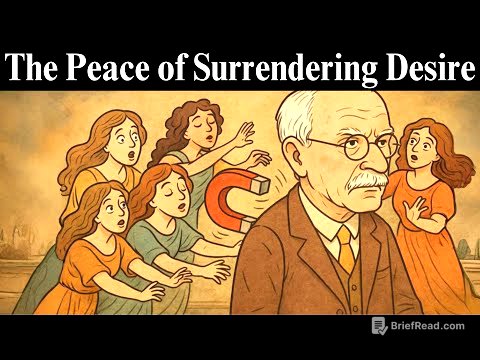TLDR;
In this episode, Ashish Vidyarthi reunites with actor Sayaji Shinde to explore Shinde's life journey, from his childhood in a village without electricity to his successful acting career and his passion for environmental conservation. They discuss the influence of folk arts, the challenges of balancing a banking job with theater, and the importance of giving back to nature. Shinde shares his experiences in the film industry, his approach to acting, and his inspiring initiative to plant trees in drought-stricken areas.
- Sayaji Shinde's early life in a village without electricity and his introduction to acting through local theater.
- His journey from a watchman to a successful multilingual actor.
- Shinde's environmental initiative, inspired by his mother, to plant trees and promote ecological balance.
Glimpse of What's Coming Up [0:00]
The video opens with a playful challenge involving a saree and a discussion about keeping memories alive through nature. Sayaji Shinde shares a personal story about his mother and his commitment to planting trees in her memory. He touches on his early aspirations of becoming an actor and his 17-year career in a bank.
Ashish Vidyarthi x Sayaji Shinde - Reunite After 10 Years [1:48]
Ashish Vidyarthi introduces Sayaji Shinde, highlighting their long-standing professional relationship, particularly in South Indian cinema. They express their pleasure at reuniting after many years and set the stage for a conversation about Shinde's life and career.
No Electricity till ’81 — Sayaji’s Raw Village Childhood Story [2:50]
Sayaji Shinde recounts his childhood in Kamthi, a village in Maharashtra, where electricity arrived only in 1981. He describes the simplicity of village life, where days were defined by work and sleep, and evenings were lit by kerosene lamps. Shinde shares his early education experiences, including walking long distances to attend school after moving to his aunt's house in seventh standard.
The Sari Challenge That Sparked an Acting Dream [5:33]
Shinde narrates a humorous incident where he dressed in a saree as a challenge, which led to him being cast in a local drama. He explains that women didn't participate in local plays at the time, so he was given the role of a girl. He describes how the plays were performed with prompting, where someone would speak the lines and the actors would repeat them.
Tamasha & Jatra — India’s Forgotten Live Theatre Universe [6:53]
The discussion shifts to the traditional performing arts in India, particularly Tamasha and Jatra. Shinde explains that these performances were seasonal, often occurring during the Yatra (annual fair). He details various folk forms like Bhajan, Kirtan, Bharud, Gondri, and Nandiwala, emphasizing their role in storytelling and community entertainment. These artists relied on the villagers for support and were integral to local festivals and weddings.
About Ashish Vidyarthi's father— Hidden History of Indian Folk Art [9:59]
Ashish Vidyarthi shares that his father, Govind Vidyarthi, worked at the Sangeet Natak Academy and documented performing artists across India. His father recognized the importance of patronage for these artists, as they were losing opportunities and turning to other professions. This led to the creation of institutions where these artists could teach their art to others.
Full-Night Improv Shows — How Rural Theatre Worked Without Scripts [11:43]
Shinde describes how Tamasha artists would gather in the evenings to decide on the next day's performance, improvising the entire spectacle. He recalls walking long distances to witness these performances and idolizing the artists. The plays would run all day and night, with the entire village participating.
From Watchman to Actor — Sayaji’s Grit Story Begins [13:31]
Shinde continues his story, detailing his education and eventual job as a watchman in the Irrigation Department after completing his Diploma in Education. He simultaneously pursued his graduation from Lal Bahadur Shastri College, studying Marathi. During this time, he became involved in theater, inspired by Sunil Kulkarni from Ghashiram Kotwal.
Shaadi ke Kapdo mein Workshop Entry — How Mumbai ’82 Changed Everything [17:00]
Shinde recounts his marriage and subsequent move to Mumbai in 1982, where he attended an acting workshop by Jaydev Hattangadi and Rohini Hattangadi. He humorously describes attending the workshop in his wedding clothes due to a lack of other options. Shinde emphasizes the importance of studying acting and learning its methods.
Balancing Banking Job with Theatre [19:41]
Shinde discusses his 17-year career in a cooperative bank, which he balanced with his passion for theater. He mentions the tradition of banks supporting performing arts and participating in play competitions. Despite his bank not participating, Shinde continued his theater work, attending workshops and rehearsals while managing his bank job.
Sayaji's Secret Routine and Acting Riyaaz [23:06]
Shinde shares his rigorous routine of voice and body exercises, memorizing pieces for dramas, and taking notes at the NCPA and Marathi Granth Sangrahalaya. He would dedicate hours each day to acting practice, balancing it with his bank job and other responsibilities.
How Sayaji handled Humiliation & Rejection [24:12]
Shinde reflects on how he maintained his confidence despite facing ridicule and rejection. He credits his strong belief in himself and the exercises he practiced. He recalls advice from Ashok Rani, who emphasized the importance of dedicating time and effort to becoming an actor.
A Masterclass in Acting [25:30]
Shinde describes his efforts to collect and memorize poems of different rasas (emotions), write journeys, and extract pieces from novels for performance. He emphasizes the importance of understanding and expressing various emotions through his acting.
Stanislavski Meets Natyashastra — The Science of Real Performance [29:22]
The conversation shifts to the science of acting, with Shinde discussing the importance of thought preceding speech. He explains how he visualizes scenes and emotions before expressing them. They touch on Stanislavski's method of emotional memory and how it connects to Natyashastra. Shinde shares his experience of studying Bharat Muni Natya Shastra and learning about rasas and postures.
The Call That Changed Everything — How Shool Happened [33:53]
Shinde recounts how he received a call from Manoj Bajpayee, leading to his role in the film "Shool." He shares his initial ignorance about Manoj Bajpayee's fame and his meeting with Ram Gopal Varma and Anurag Kashyap, which ultimately led to his selection for the role of Bachchu Yadav.
Quitting Bank Job - Entering Film Industry [36:02]
Shinde discusses the positive reaction from his bank colleagues after the success of "Shool." He eventually resigned from his bank job, despite the bank's offer to continue paying him for six months. Shinde expresses his confidence in his decision and his belief that no soul is ever too big or too small.
Film Shoot Ka Kissa - A Life Changing Lesson [36:47]
Shinde shares a story from his early days in Hyderabad, where he and Ashish Vidyarthi were shooting together. He recalls a conversation where he told Vidyarthi that he never feels sad because he is always in the plus side. Shinde attributes this to his father's teachings: "Don't go to the doctor, don't go to the advocate, eat meat and bhakri, and be happy wherever you live."
Entering Tamil Cinema as Subramania Bharati [40:42]
Shinde narrates how he entered South Indian cinema with the role of Subramania Bharati in a Tamil film. The director, impressed by his performance in "Shool" and his Marathi theater background, selected him for the role. Shinde describes his rigorous preparation for the role, including writing down Tamil dialogues and understanding their meaning.
Inside Sayaji’s Life as an Actor [44:07]
Shinde discusses his life as a traveling actor, working in multiple languages and cultures. He shares his initial difficulty with adapting to different cuisines but eventually growing to appreciate them. Shinde emphasizes his disciplined routine as an actor, including early sleep, early wake-up, and constant rehearsal of dialogues.
Aam Ka Kissa [49:48]
Shinde and Vidyarthi reminisce about a memorable experience at a Sardarji's house, where they ate Himayat mangoes filled with ice cream. They recall the story associated with the mango and the joy of sharing it with others.
Being a Multilingual Actor in a Multicultural India [50:54]
Shinde reflects on his experiences working in different cultures and languages, noting the similarities between Telugu and Marathi. He emphasizes the importance of local artists and the beauty of every language. Vidyarthi shares his perspective as someone who has lived in various parts of India, appreciating the diversity and cultural richness of the country.
From Drought to Devarai — The Birth of a Tree Revolution [53:43]
Shinde discusses his involvement in environmental conservation, starting with a response to the 2016 drought in Maharashtra. He recounts a meeting where he proposed planting trees to improve the village, leading to the concept of Devrai (sacred forest).
Keeping Maa Alive - A Tribute to Sayaji''s Mother [55:39]
Shinde shares his inspiration for planting trees in memory of his mother. He explains that trees provide oxygen and food, essential for life, and planting them is a way to keep his mother's memory alive. He describes the growth of his tree-planting initiative across Maharashtra.
A Genius Idea to Heal the Planet [58:00]
Shinde introduces another idea to promote environmental conservation: giving plants as prasad in temples. He suggests that offering local tree saplings as prasad would encourage people to plant and care for them, benefiting nature.
Generating 50 Lac to 1 Crore Income [59:26]
Shinde mentions his plan to plant tamarind trees in each village, which he believes will generate significant income for the villages in the future.
What True Satisfaction Feels Like [1:00:18]
Shinde expresses that the greatest satisfaction comes from seeing people happy. He believes that giving happiness to others is more important than material possessions.
The Only Success Formula That Works [1:01:29]
Vidyarthi praises Shinde for doing what he wants to do and inspiring others. Shinde emphasizes the importance of planting trees equal to one's age and encourages people to prioritize nature over material possessions.
₹17 Lakh Raised and 16,000 Trees Planted [1:03:54]
Shinde shares a story about planting trees in a village that had been barren for 60 years. Through community effort, they raised ₹17 lakh and planted 15-16,000 trees, transforming the landscape.
One Final Thought — And a Question for You [1:04:41]
Vidyarthi concludes the conversation, expressing hope that their discussion has inspired viewers. They encourage viewers to share their thoughts and ideas.









